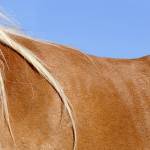Assessing Back Pain as a Measure of Equine Welfare

Domesticated horses depend entirely on their caretakers to provide basic needs. A keen, well-practiced eye can often pick up small changes in horses that may suggest a welfare issue, even among horses whose caretakers have the best intentions. Subtle changes in posture or the development of back pain, for example, can indicate compromised welfare.
“Horses with compromised welfare often develop certain body postures or behaviors. For example, some horses respond to restrictive conditions by developing stereotypies, “depressed” postures, or higher emotional states,” said Laura Petroski-Rose, B.V.M.S., a Kentucky Equine Research staff veterinarian.
Horses with depressed posture may:
- Stand immobile;
- Hold their eyes wide-open;
- Stretch so their backs and necks are on the same line, ears generally backwards; or
- Be indifferent towards environmental stimuli.
According to a group of French veterinary behaviorists*, some horses subjected to chronic stress, fear, or discomfort produce contractions of the back muscles, resulting in deterioration of the musculoskeletal structures of the back and neck. This alters the normal shape or contour of the neck, back, and withers, potentially contributing to the high incidence of back pain in certain horses.
To further explore the concept of using body posture to assess welfare, the researchers analyzed the dorsal outline of 85 horses. The welfare of those horses was also assessed using various scales and measures as described in the full-length study.
The behaviorists noted that horses with stereotypic behaviors—a possible indicator of subpar welfare—had depressed-like posture and ear positions. In addition, those horses tended to have a flatter, or even hollow, dorsal profile, particularly at the neck and croup levels.
“These altered profiles could represent an additional indicator of poor welfare, easy to use in the field or by owners,” concluded the authors.
According to Petroski-Rose, “Preventing the development of back pain and stereotypies by avoiding situations of compromised welfare clearly would be advantageous. Ensuring adequate nutrition and time on pasture; proper equipment fit; socialization with other horses; and routine veterinary, farrier, and dental care all contribute to maximal quality of life for our charges.”
For more information on how to meet the nutritional needs of your horses, including those that could benefit from specialized nutritional supplements, contact a nutrition advisor today!
*Sénèque, E., C. Lesimple, S. Morisset, et al. 2019. Could posture reflect welfare state? A study using geometric morphometrics in riding school horses. PLoS One. 14(2):e0211852.








